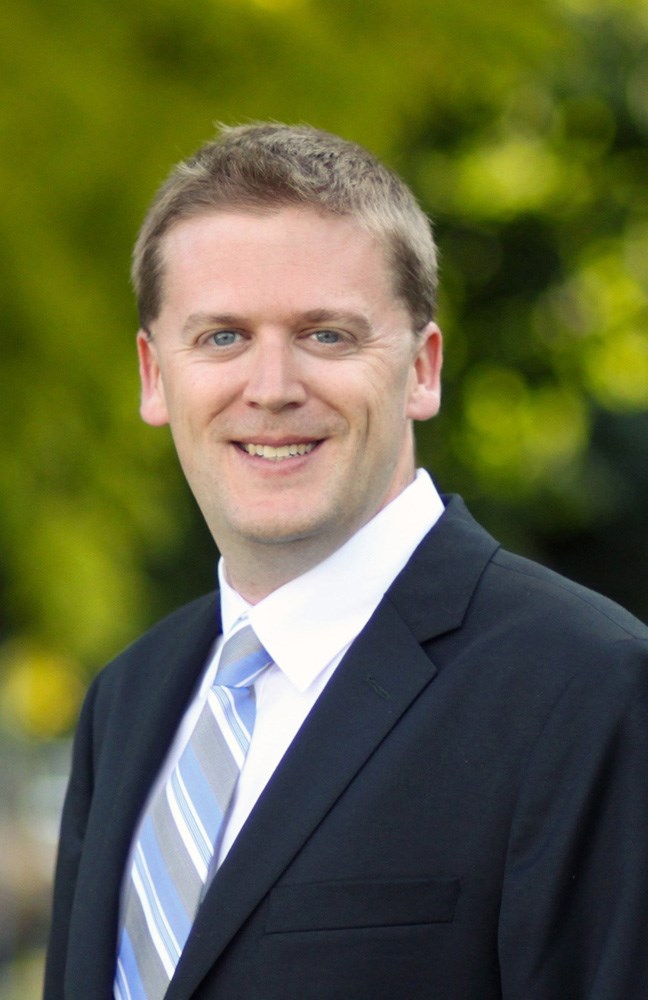New Westminster residents shouldn’t be surprised if Mayor Jonathan Cote comes knocking at their door in the months ahead.
On Thursday, 18 of 21 members of the Mayors’ Council on Regional Transportation voted in favour of seeking a 0.5 per cent increase to the provincial sales tax to generate funding to expand the regional transit and transportation system. If approved by the provincial government, about one million residents of Metro Vancouver would be able to cast votes through a mail-in ballot from mid-March to April 2015.
“There was strong support among the mayors council to move forward with the referendum question that included a 0.5 per cent increase in the provincial sales tax,” Cote told The Record following the meeting. “When it came down to it, that revenue source seemed the most equitable and most easily and efficiently provided the revenue that our transportation system needed.”
Cote said the PST was also one of the forms of taxation that garnered strong support when the mayors’ council was doing polling on the topic.
“People resonated with that, felt it was more fair,” he said. “There was also polling done on a combination of different tax sources, say a smaller sales tax combined with a vehicle levy. We found whenever different taxes were combined people generally were not supportive and felt it was more confusing. The sales tax had greater appeal with the public we are serving.”
Cote said the mayors didn’t ask for the referendum, but recognize that the provincial government won a recent provincial election and one of it platforms was to hold a referendum.
“I am confident this is a very winnable referendum,” he said. “I know at times people are not comfortable or excited about new taxes in the region, but I think there is a growing recognition that transportation is a huge issue, not only in New Westminster but in Metro Vancouver, and that if we don’t properly invest in our transportation system and our public transit, we are going to pay far more down the line by seeing a decrease in livability in our region and a real negative impact to our local economy.”
The mayors’ council had considered three potential sources of funding, including: an increase to the existing B.C. carbon tax, which would be charged on fossil fuel purchases within Metro Vancouver; an increase to the existing provincial sales tax, which would be charged on PST-eligible purchases in the region; and an annual vehicle registration fee, or a combination of these tools.
“Today was Day 1 of the campaign as far as I am concerned,” Cote said. “I am strongly in support of seeing this referendum be successful and the region being able to invest in transportation infrastructure. I think the next question is: how do we get the information out to the public and what role to mayors and councils play in advocating for a positive result to this referendum?”
Cote is pleased to see a number of groups coming together with a goal of supporting the referendum and promoting a positive response. He noted there were business, union and environmental groups at the meeting who are joining together to support the referendum.
“I think that’s a great start,” he said. “I think we need to continue to build these coalitions and partnerships because that is how we are going to be able to win this referendum.”
Cote is more than willing to do his part in ensuring the referendum is successful. During the recent civic election campaign, Cote knocked on thousands of doors in his quest to become mayor.
“The campaign, I guess is starting. You may find me back out on the doors doing some door-knocking for this campaign as well,” he said. “I really think when it comes to the region’s transportation system, we are just going to stagnate for the next four years unless we are able to be successful with this referendum. To me, I am going to be a strong advocate for making sure that we get a positive result so we can spend the next four years investing in our transportation system and starting to resolve what I think is the region’s biggest issue.
Cote said he would seriously consider door knocking in support of the referendum.
“I think this is about connecting with people. It’s going to be a mail-in ballot so often those types of elections can get lost in people’s mail and back of mind,” he said. “I think it’s up to individual mayors and councils to really connect with their residents, just like we did in the municipal campaign, because it’s that important of an issue.”
The province has ordered the mayors’ council to hold a referendum before June 30 next year. If the referendum fails, the next opportunity to put new funding sources to the public is during the next municipal election in 2018.
Transportation Minister Todd Stone thanked the mayors’ council for its hard work on the TransLink referendum file over the past seven months and congratulated them for coming together to develop a vision and a referendum question. He plans to fully review the proposed referendum question and provide a response on behalf of the provincial government before Christmas.
“There will be impacts no matter which source you decide to go with,” he said. “We are working our way through that analysis.”
During a teleconference with media, Stone said the province understands the importance of transportation and transit investment and recognizes there is no perfect funding source.
“I think the mayors have hit the mark for the most part with this question,” he said. “I applaud them for that.”
Stone said the province won’t be providing any direct resources toward the yes or no campaigns related to the referendum, but he will be speaking out strongly about the need to attack congestion, to make investments in road and bridges and to get people out of their cars.
With Vancouver Sun files



